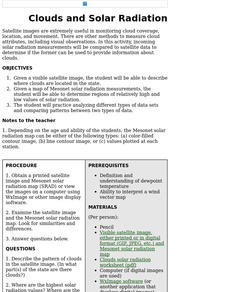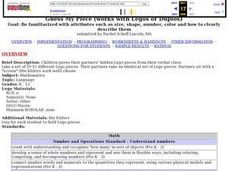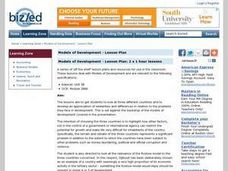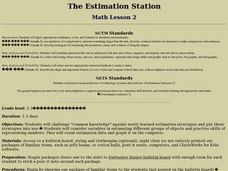Curated OER
Molar Ratio
Pupils conduct an experiment in which they react sodium bicarbonate with hydrochloric acid to determine the molar ration between the two reactants. Students must write correct formula and a balanced chemical equation and explain how it...
Curated OER
Clouds and Solar Radiation
Young scholars examine how clouds affect incoming solar radiation. They compare and contrast satellite images and incoming solar radiation measurements as methods to provide information about clouds.
Curated OER
Sunrise and Sunset - Graph of Daily Solar Radiation
Students use a graph of daily solar radiation to determine the times of sunrise and sunset. They also compare how sunrise, sunset, and the length of the day changes with latitude and longitude.
Curated OER
Time-Lapsed Observations
Students explore timed observations for science investigations. They record ideas on a chart related to a classroom closed terrarium. They repeat their observations for several days and time observations for changing shadows during the...
Curated OER
Understanding Cloud Formation
Students read and relate the poem, "Clouds" by Aileen Fisher to a demonstration on cloud formation. They create clouds in jars using ice water and matches then discuss the ways clouds can be used to predict weather.
Curated OER
A Functional Housing Market
Students access the Internet to search for housing prices in Houston, Texas,(the location can be changed to accommodate any location) and compare the prices to the number of square feet found in the living area of a house.
Curated OER
And Around We Go!
Sixth graders conduct a survey and collect data to construct a bar graph that will then be changed into a circle graph. With the bar graph, 6th graders compare estimated fractions and percentages and estimate percentages. With the circle...
Curated OER
Annotating Change in Satellite Images
Students compare a series of satellite images taken 3-4 years apart to investigate the effects of human land use. They annotate the images using ImageJ software and use the annotated images to explain their findings.
Curated OER
Weather Words
Third graders gather together as a class and share any facts or words about the science unit "Weather Elements". They listen to the story/poem, "Listen to the Rain" and recall any weather related words from the story.
Curated OER
Guess My Piece -working with Legos
Young scholars participate in guessing their partners' hidden Lego pieces from their verbal clues. They work in partners to accomplish their goals. They are meeting a variety of math standards by completing this activity.
Curated OER
Sugar Bush Sap Production - Human Environmental Impact on Sap Sand
Eleventh graders compare the amount of sugar sand present in tree sap. In this environmental science instructional activity, 11th graders measure different tree circumference. They prepare a report and share findings in class.
Curated OER
Food Type And Calories Per Square Meter
Learners compare the efficiency of producing food calories in different types of food then calculate how much land is required to supply their food for a year. They then graph the results.
Curated OER
Movement, it's FUN-damental!
High schoolers discover how muscles work. In this biology lesson plan, students explain the causes of fatigue and muscle soreness. They create graphs and compare results with their classmate.
Curated OER
Diversity Under the Roof of the World
Pupils learn about Nepals many cultures, religions, and landscape. They compare a Nepal student to an American student and relate location, place, and culture of American and Nepals. They discuss reasons why they think there is such...
Curated OER
Models of Development
Students examine the main characteristics of models of development. They list the limitations of each model. They compare and contrast the models and explain how they would move a business toward further development.
Curated OER
Around and Across
Tenth graders investigate the circumference and diameter of a circle. In this geometry lesson, 10th graders relate circumference to diameter. They create a scatter plot to estimate the value of pi.
Curated OER
Lesson #46: Bar Graphs and Line Graphs
In this bar graphs and line graphs worksheet, students interpret bar graphs, line graphs, and box-and-whisker plots. They find the measures of central tendency. This three-page worksheet contains notes, vocabulary, and approximately 10...
Curated OER
The Estimation Station
Young scholars challenge "common knowledge" against newly learned estimation strategies and put those strategies into use. They consider variables in estimating different groups of objects and practice skills of representing numbers.
Shodor Education Foundation
Graphing and the Coordinate Plane
Ready to introduce your class to the coordinate plane? This website includes a detailed lesson plan that includes two interactive games to help learners practice graphing ordered pairs. The scripted discussion is a little cheesy and a...
Mathematics Vision Project
Quadratic Equations
Through a variety of physical and theoretical situations, learners are led through the development of some of the deepest concepts in high school mathematics. Complex numbers, the fundamental theorem of algebra and rational exponents...
Curated OER
Genetics Survey Project
Complete a survey on genetics and the mechanics of heredity.and review the list of human traits observed. Practice interviews are conducted with each other so that noone feels unconformable if they don't have one trait or another. One...
Curated OER
Comparison Shopping
Elementary schoolers explore the concepts associated with comparison shopping, and the concept of need versus want. They also look closely at the power of advertising and become more aware of the messages that ads present. After taking...
Curated OER
What is the Nature of Science?
Conduct a survey about the nature of science with your high schoolers. They will record their responses in a table and then discuss the implications of scientific theory. Note: There are activity sheets, and forms included with this lesson.
Curated OER
WebQuest Solar System Colonization Project 2000
Sixth graders investigate the livability of different planets in the universe by researching and organizing information from a number of sources in this unit project. They decide on a location for a space station which they support in an...

























